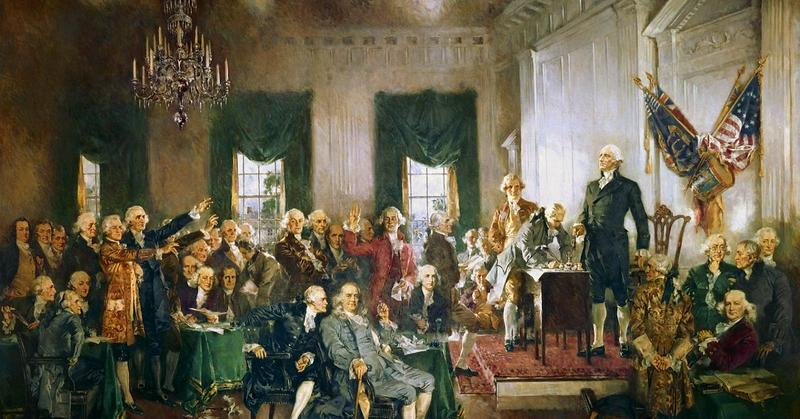How The Electoral College Was Created To Give The South More Votes
By | September 30, 2020

To paraphrase the Insane Clown Posse, "The electoral college—how does it work?" We all more or less know that a candidate needs to win a majority of the electoral college, regardless of their showing in the popular vote, to win the presidency, but since the 2000 election, this function of the government has felt fairly arbitrary. Way back in its infancy, however, the burgeoning U.S. government decided a fail-safe was needed to ensure that every state in the Union had a voice, not just the states with the densest population.
Of Course, Slavery Was Part Of It
In 1787, delegates assembled in Philadelphia to determine how the president and vice president would be chosen, because 11 years into being a country, they figured it was time to check that task off their to-do list. Some proposed letting Congress figure it out, but that would have resulted in a power imbalance between branches of the government, so that idea was scrapped. Pennsylvanian James Wilson proposed a simple popular vote, but delegates had issues with that plan as well. Specifically, Virginia's James Madison argued that a popular vote would always favor Northern states because they had more voters. That might seem perfectly fair, but to many Americans, the "States" half of the country's name was and is pretty important. Madison proposed a compromise: Why not count the South's more than half a million slaves?

The Three-Fifths Compromise
Of course, slaves in the U.S. had no right to vote. In fact, under the electoral college, the people didn't (and technically, still don't) vote for the president at all. Each state appoints a certain number of independent electors based on the state's population, who have voted, throughout U.S. history, with varying degrees of influence from the people. What the Southern delegates were suggesting was to include slaves, who had basically no rights as Americans, in their population counts.
The members of the Philadelphia Convention agreed to a compromise: They allowed Southern states to count every three out of five slaves as people, supposedly balancing out the populations of the territories and netting the South more electoral votes. Thanks to the Three-Fifths Compromise, Virginia left the convention with 12 out of a total of 91 electoral votes, more than one-quarter needed to win a presidential election. They had, perhaps, taken fairness to the opposite extreme. It's no surprise that four of the first five presidents—George Washington, Thomas Jefferson, James Madison, and James Monroe—were slave holders from Virginia.

The Founders Didn't Anticipate Partisan Politics
When the members of the Philadelphia Convention settled on the electoral college, they didn't leave any instructions for how the states should divvy up their votes. They assumed that each elector's vote would go to whomever they felt should be president, but as partisan politics gelled at the end of the 18th century, entire states began to sway towards one candidate or another, and the decision was more or less made for them. Today, almost every state has passed laws requiring their electors to vote for the candidate chosen by their state's people.
Since they assumed the electors would have a wide variety of candidates to choose from, however, each elector was granted two votes, and the runner-up in the presidential election was appointed vice president. It turns out that's not a great system when there's only two parties. In 1800, when Democratic-Republicans Thomas Jefferson and Aaron Burr both ran with the understanding that the former was favored for president and the latter for vice president, they ended up tying. The decision was left to the House of Representatives, whose members of the opposing Federalist Party plotted to vote for Burr because his views were at least a little more in line with their own, and the whole thing ended up a deadlocked mess. Eventually, Jefferson reigned victorious, but it was quickly decided that electors should get one vote for president and one vote for vice president.

Still Controversial
The electoral college is a controversial system to this day because, even though slavery has long been outlawed, it still disproportionately distributes electoral votes. Every state gets a minimum of three electoral votes if even one person lives there. Of course, that's an extreme scenario, and that number increases with population size, but there's also a maximum number of electoral votes any state can get. In practice, that means that as of 2016, any one person's vote from the least populated state (at the time, Wyoming) counted as much as 3.6 votes from the most populated state (California). On average, the 10 least populated states have 2.5 times more voting power than the 10 most populated. As more citizens flock to big cities and the political divide between urban and rural voters deepens, the growing power of the rural vote seems to be propelling the electoral college toward a breaking point. Only time will tell when, or if, it reaches it.

